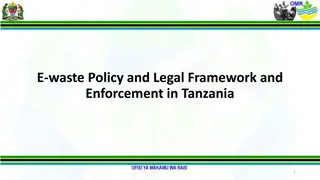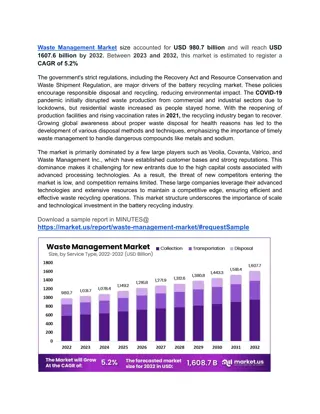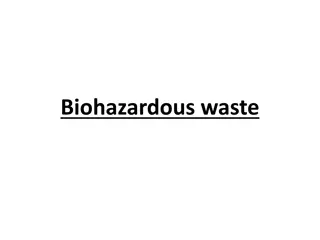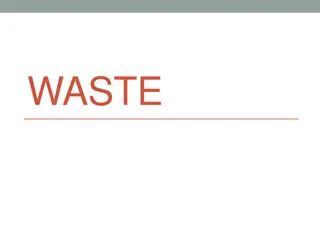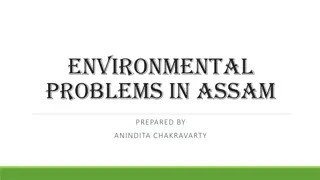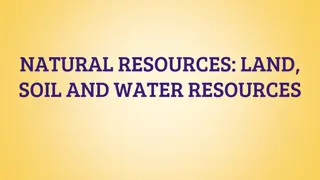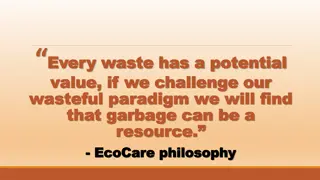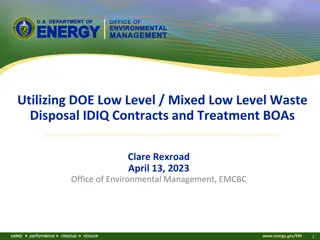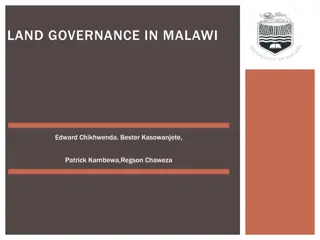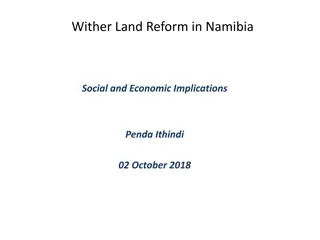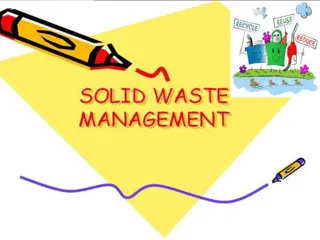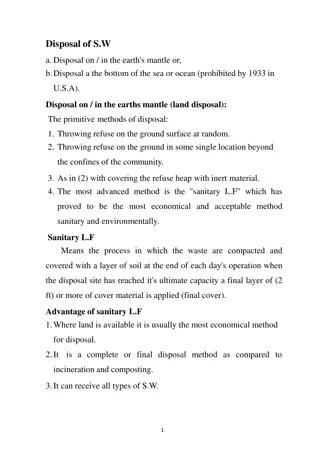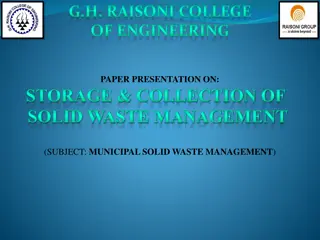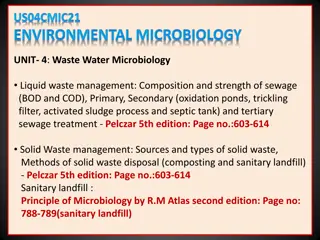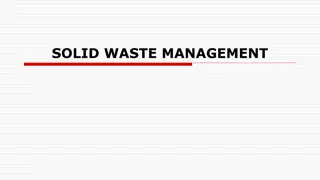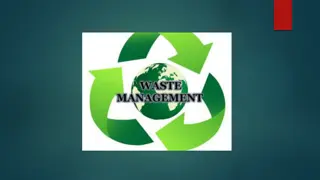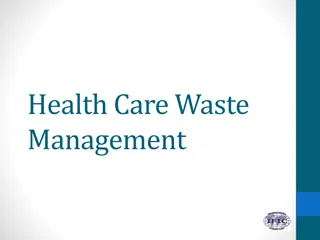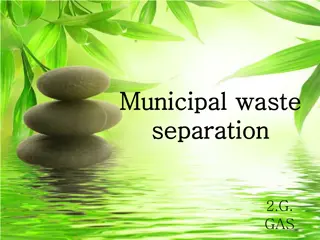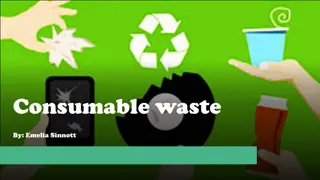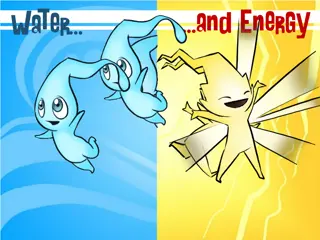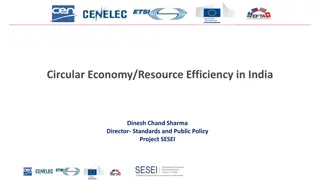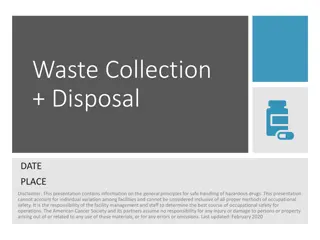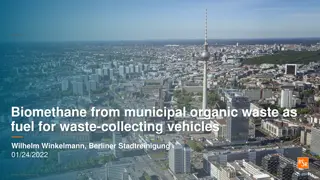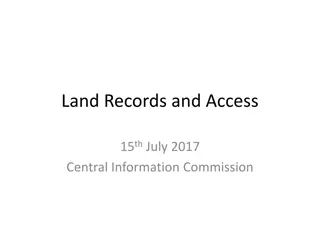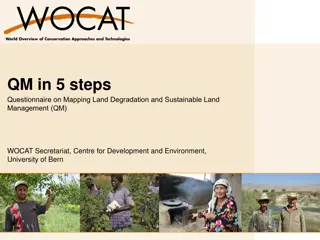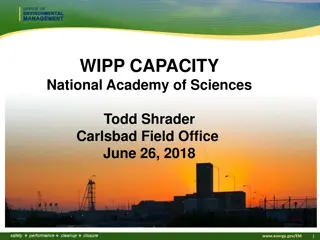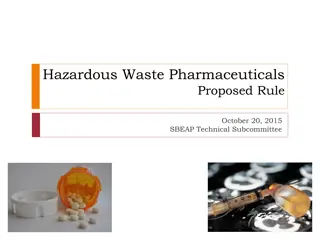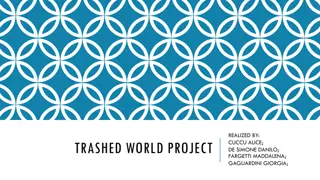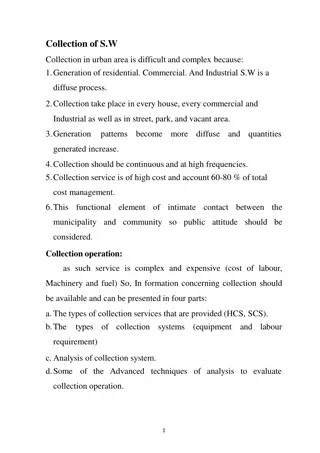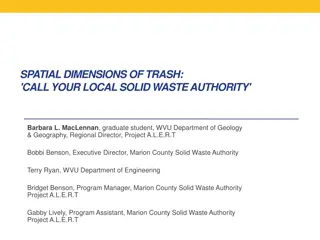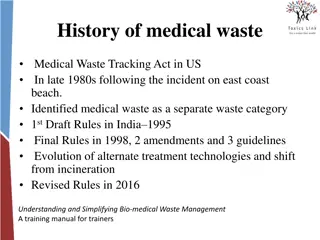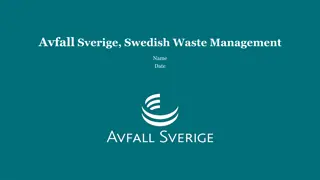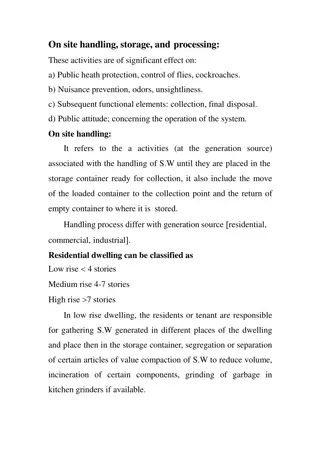Best Waste Services in Westminster
Looking for the Best Waste Services in Westminster, then visit Hart Waste and Recycling Services Ltd. They are a waste and recycling collection Service, they collect and dispose of waste and recycling at a convenient time of your choosing, 24 hours a day, & Seven days a week 365 days a year. They co
0 views • 6 slides
National Radioactive Waste Management Plan Overview
Briefing the Select Committee on Land Reform, Environment, Mineral Resources, and Energy about the South African Radioactive Waste Management Programme and the legislative background governing radioactive waste management. The presentation outlines the framework, guiding elements, waste management p
4 views • 19 slides
E-Waste Policy and Legal Framework in Tanzania
Tanzania has established a comprehensive institutional and legal framework for the management of e-waste, including the National Environmental Policy and the Environmental Management Act. The regulations governing e-waste cover licensing, permitting, standards, fees, charges, environmental impact as
0 views • 10 slides
Waste Management Market Witnesses Technological Disruptions
Waste Management Market by Waste Type (Municipal Waste, Medical Waste, Industrial Waste, and E-Waste), By Service Type (Collection, Transportation, and Disposal), By End-User, By Region and Companies - Industry Segment Outlook, Market Assessment, Com
0 views • 4 slides
Waste Bureau Mandate Presentation Highlights
The Department of Forestry, Fisheries & the Environment's Waste Bureau presentation on May 25, 2021, outlined its legal mandate, operational performance, challenges, and key focus areas for 2021/22. The Waste Bureau functions as a specialist implementing agent, promotes waste minimization and recycl
1 views • 11 slides
Understanding Biohazardous Waste Management
Biohazardous waste poses a threat to living organisms, particularly humans, due to biological hazards like medical waste or toxins. This waste includes categories such as solid, liquid, sharps, and pathological waste, each requiring proper segregation and disposal to minimize health risks. Learn abo
0 views • 15 slides
The Growing Issue of Waste Generation
Solid waste, including discarded materials like garbage and refuse, is piling up rapidly, with the US alone generating over 10 billion metric tons annually. The trend of single-use products has exacerbated the problem, leading to a doubling of waste production per American since the 1960s. Disposal
0 views • 23 slides
Environmental Challenges in Assam: Solid Waste and Deforestation Issues
Assam faces critical environmental problems such as solid waste mismanagement and deforestation. The syllabus emphasizes three main issues: solid waste management, deforestation, and watershed management. Solid waste, categorized by origin, hazard potential, and contents, poses significant challenge
0 views • 15 slides
Understanding Land, Soil, and Water Resources
Natural resources such as land, soil, and water are crucial for human activities. Land comprises the lithosphere and is utilized for various purposes based on land use patterns. The study of land use patterns is essential for economic planning, as the availability of land is limited, leading to conf
5 views • 25 slides
Embracing the EcoCare Philosophy for Sustainable Waste Management
Challenging the current wasteful paradigm, EcoCare philosophy advocates for turning waste into a valuable resource. Addressing the challenges of waste management, the initiative aims to shift towards a people-oriented approach by promoting waste-free communities, democratizing recycling, and advocat
0 views • 14 slides
Utilizing DOE Low-Level & Mixed Low-Level Waste Disposal Contracts
EMCBC manages disposal and treatment contracts for Low-Level Waste (LLW) & Mixed Low-Level Waste (MLLW). Eligible users include DOE offices, prime contractors, and subcontractors. Services cover various waste types including radioactive materials, sealed sources, and TSCA-regulated waste. Specific c
0 views • 19 slides
Waste Management Priorities in Solomon Islands
The presentation by Debra Kereseka at the PACWASTEPLUS Steering Committee Meeting highlighted key waste management priorities in the Solomon Islands. Topics covered include the management of different waste streams, challenges faced, and clarifications for the project management unit. Priorities inc
0 views • 7 slides
Land Governance in Malawi: Challenges and Progress
Malawi's land governance system has evolved significantly since the colonial era, with a framework that includes institutional and legal aspects. The country has faced challenges in managing land disputes, valuation, taxation, and public land use. The institutional setup involves the central governm
0 views • 23 slides
Implications of Land Reform in Namibia: Social and Economic Insight
Land reform in Namibia is crucial for inclusive growth and shared prosperity, with access to land being a key factor. Productive land usage can lead to wealth creation and social development. The importance of agriculture in the economy is highlighted, along with the need for skilled farmers and a s
0 views • 7 slides
Understanding Solid Waste Management and Classification
Waste management encompasses a wide range of materials and practices, from solid and liquid waste to hazardous and non-hazardous substances. Learn about different types of waste, sources of waste generation, classifications based on health and environmental impact, as well as origins and types. Expl
0 views • 35 slides
Municipal Waste Management Costs and Legal Requirements in Georgia
The municipal waste management system in Georgia incurs various costs including waste collection, transportation, disposal, and administration. Municipal waste charges must adhere to legal requirements such as the Polluter Pays principle and limits on charges. The Law of Georgia on Local Fees regula
0 views • 26 slides
Efficient Methods and Considerations for Solid Waste Disposal
Efficient methods for solid waste disposal include sanitary landfilling, which involves compacting waste and covering it with soil daily. Advantages of this method include economic viability and flexibility in waste disposal. However, challenges such as limited suitable land availability and potenti
0 views • 10 slides
Effective Solid Waste Management Strategies for Communities
Solid waste management is crucial for maintaining hygiene and preventing health hazards in communities. Proper storage and collection methods ensure efficient waste disposal and reduce environmental impact. This paper presentation discusses the importance of waste management, emphasizing the need fo
0 views • 43 slides
Understanding Waste Water Microbiology and Solid Waste Management
Waste water microbiology involves the analysis of liquid waste in terms of its composition, strength (BOD and COD), and treatment processes. It covers the sources and types of solid waste, along with methods of disposal like composting and sanitary landfilling. The chemical characteristics of waste
0 views • 36 slides
Understanding Solid Waste Management and Its Importance
Waste management includes the collection and treatment of solid waste to protect the environment. Waste is seen as a resource, with categories such as municipal and industrial waste. Proper waste management is crucial to prevent pollution and disease outbreaks. Principles include an integrated appro
0 views • 20 slides
Waste Management Challenges and Solutions in India
Waste generation is a growing concern in India due to rapid urbanization and changing consumption patterns. This article explores the types of waste, sources, and the magnitude of the waste problem in India. It also discusses the public health importance of waste management, current challenges faced
0 views • 41 slides
Effective Health Care Waste Management Guidelines
Proper management of health care waste is crucial for creating a safer environment for staff, waste workers, and the public. This involves describing various types of waste, outlining waste sources, segregating waste appropriately, and listing treatment options. Key points include focusing on sharps
1 views • 28 slides
Municipal Waste Separation in Slovakia: Challenges and Trends
The production of municipal waste in Slovakia has been on the rise, even during the pandemic. Despite spending more time at home, waste generation increased due to factors like home deliveries with disposable packaging. Waste generation varied by regions, with the west producing more waste than the
0 views • 18 slides
Sustainable Practices for Reducing Consumable Waste
Consumable waste poses environmental challenges for consumers, impacting them both positively and negatively. This overview discusses food waste, the impact of packaging materials, and suggestions for reducing waste creation. Understanding where packaging waste ends up and how food waste can be comp
0 views • 7 slides
Understanding E-Waste Recycling: Benefits and Challenges
Electronic waste (E-waste) poses significant environmental and health risks due to its toxic components. Proper handling and recycling of E-waste can bring economic and environmental benefits. While some states in the United States have effective E-waste collection and recycling programs, there is a
0 views • 14 slides
Understanding Waste Management: Facts and Solutions
In this informative content, the importance of energy conservation, water preservation, and waste management is highlighted. It sheds light on the limited availability of usable water on our planet, the need for renewable energy sources, and the impact of waste generation on the environment. Learn a
0 views • 52 slides
Circular Economy and Resource Efficiency Policies in India
India has implemented regulations and policies to manage plastic and e-waste efficiently. The Plastic Waste Management Rules, 2016 aim to increase plastic bag thickness, promote waste recycling, and enforce producer responsibility. The E-Waste Management Rules, 2016 focus on e-waste collection targe
1 views • 16 slides
Proper Handling and Disposal of Hazardous Drugs and Waste
Guidelines for the safe handling and disposal of hazardous drugs and waste in healthcare facilities. The content covers training modules, waste collection, sources of healthcare waste, disposal methods, and legal regulations related to the disposal of hazardous drugs. Various types of healthcare was
0 views • 21 slides
Sustainable Solution: Biomethane from Organic Waste for Waste-collecting Vehicles
Explore the innovative concept of converting municipal organic waste into biomethane fuel for waste-collecting vehicles in Berlin. The process involves fermentation of organic waste, preparation of biogas, feeding into the natural gas grid, and utilization in the vehicle fleet, showcasing a unique a
0 views • 15 slides
Importance of Land Records in Preventing Land Disputes
Land records play a crucial role in documenting ownership, facilitating land-related transactions, and preventing costly litigation. They serve as a lifeline for effective governance and provide legal status to landowners, ensuring clarity and transparency in land ownership. Without proper land reco
0 views • 15 slides
Impact of Land Policies in Georgia: Headright System, Land Lotteries, and Yazoo Land Fraud
Georgia pursued various land policies post-Revolutionary War to allocate land obtained from Native Americans. The headright system granted land to soldiers and white men, aiming to boost population and state power. Land lotteries distributed land through random draws. The Yazoo land fraud scandal ta
0 views • 20 slides
5 Steps Questionnaire on Mapping Land Degradation and Sustainable Land Management
Preparation for mapping land degradation and sustainable land management involves steps such as preparing the base map, identifying contributing specialists, assessing land use systems, understanding land degradation types, and providing expert recommendations. The process includes analyzing area tr
0 views • 32 slides
WIPP Waste Disposal Capacity Overview
The Waste Isolation Pilot Plant (WIPP) has a statutory capacity of up to 175,565 cubic meters for disposal of transuranic waste. As of June 2018, 93,500 cubic meters of TRU waste have been emplaced at WIPP. The facility operates within the 16 square mile land withdrawal boundary specified by the WIP
0 views • 8 slides
Hazardous Waste Pharmaceuticals Proposed Rule Overview
This briefing provides an in-depth look at the Hazardous Waste Pharmaceuticals Proposed Rule from October 20, 2015. It covers which pharmaceuticals are considered hazardous waste, major provisions of the proposal, examples of listed hazardous waste pharmaceuticals, and the flow of hazardous waste ph
0 views • 40 slides
Understanding Waste Management and Pollution Issues in our Community
A group of individuals conducted research on waste production in Italy, highlighting the significant amount of waste generated annually. They also explored the presence of waste disposal facilities in their area, emphasizing the importance of using bins for waste disposal to maintain a clean environ
0 views • 9 slides
Challenges and Strategies in Solid Waste Collection in Urban Areas
Solid waste collection in urban areas is complex due to the diffuse nature of waste generation, varied collection locations, increased quantities of waste, high costs, and the need for continuous service. Different collection methods and systems such as curbside pick-up, alley service, set-out set-b
0 views • 5 slides
Understanding the Spatial Dimensions of Trash
Exploring the spatial impact of trash generation and disposal, this content delves into the role of local solid waste authorities in managing waste, promoting recycling, and ensuring proper waste disposal practices. From defining solid waste to the functions of waste authorities, the importance of r
0 views • 20 slides
Evolution of Medical Waste Management and Regulations in Healthcare
Medical waste management has evolved over the years, with the introduction of regulations like the Medical Waste Tracking Act in the US and the implementation of rules and guidelines in India. Various networks and organizations are involved in promoting safe waste disposal practices. The concern for
0 views • 26 slides
Sustainable Practices in Swedish Waste Management
Avfall Sverige, the trade association for waste management in Sweden, focuses on reducing waste and increasing recycling rates. With a vision of zero waste, they work towards influencing, developing, and cooperating to achieve sustainable waste management practices. Swedish waste management statisti
0 views • 9 slides
Effective On-Site Handling, Storage, and Processing of Solid Waste
On-site handling, storage, and processing of solid waste play a crucial role in public health protection, nuisance prevention, and waste management. The activities involve gathering, segregating, and compacting waste to reduce volume. Different methods are used based on the type of residential build
0 views • 8 slides


